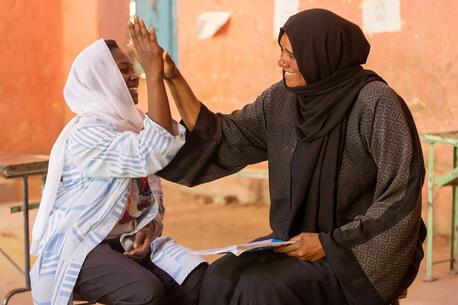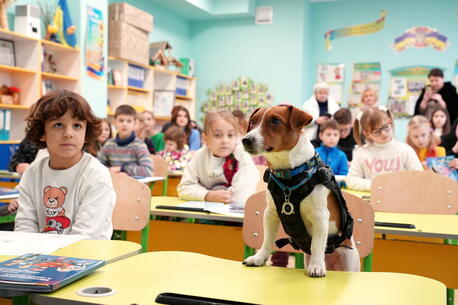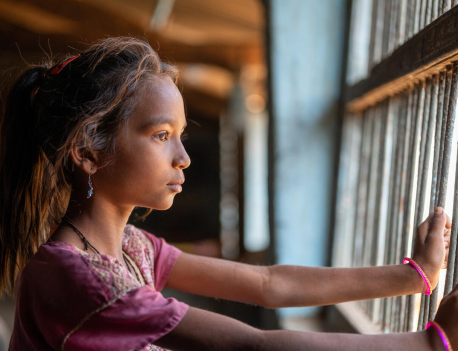
#OnMyMind: Spotlighting UNICEF Groundbreaking Report on Mental Health
This October, UNICEF USA assembled UNICEF experts, community partners and youth advocates to discuss the importance of mental health.
For the first time in its 40-year history, UNICEF’s flagship report, the State of the World’s Children, is centered on the mental health of children, adolescents and caregivers. This report comes at a critical time: An estimated 10-20 percent of children suffer from mental health issues yet countries on average spend less than 1 percent of their health budgets on mental health. In honor of World Mental Health Day (October 10), UNICEF USA brought together a range of speakers to publicize findings from the report and offer ways in which UNICEF and partners can help to bolster children’s mental health in the U.S. and around the world.
The virtual event got underway with remarks from National Youth Council Member, Ayaan S.
Yesterday, we were joined by Congressional champions, community partners, UNICEF experts and youth advocates for a launch event around the recent #OnMyMind report from @UNICEF.
— UNICEF USA (@UNICEFUSA) October 14, 2021
Nat'l Council member Ayaan did a great job kicking things off by outlining why mental health matters. pic.twitter.com/rOqriLjb2c
UNICEF’s work on mental health
Zeinab Hijazi, UNICEF Senior Mental Health Technical Advisor, underscored the report’s key themes and messages including the protective and risk factors that impact mental health. For example, exposure to poverty, disaster, discrimination and/or violence all heighten children’s risk of mental health disorders. On the other hand, protective factors such as positive parenting, a supportive school environment and access to mental health services can support children in developing positive mental health.
UNICEF Peru Representative Ana de Mendoza illustrated how supportive parenting and government investment in community-based mental health care helped treat 14-year-old Andre, who suffered from depression and anxiety during the COVID-19 pandemic. One fact the report emphasizes is that all countries — rich and poor — face a huge gap between mental health needs and access to quality services.
Partnering to advance mental health advocacy
The event also spotlighted UNICEF USA’s partnership with the Johns Hopkins University Center for American Indian Health (CAIH). Dr. Allison Barlow and Dr. Victoria O’Keefe described how COVID-19 has disproportionately impacted many tribal and Urban Native communities throughout the U.S. They also showcased the Psychological First Aid Guide, a culturally relevant manual created through the partnership to aid frontline workers who are responding to the pandemic in these communities.
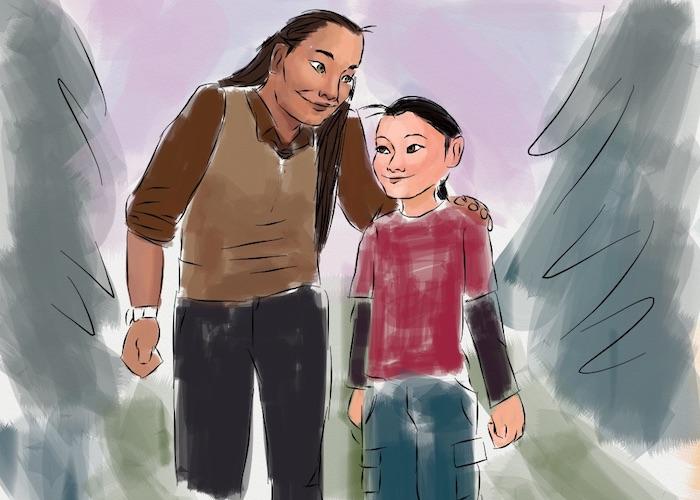
An illustration from the Psychological First Aid guide adapted for use in Native communities by the Johns Hopkins Center for American Indian Health. The guide offers strategies for supporting mental health and well-being, including detailed guidance on what to do when you encounter a child who is in serious distress, supporting family members through listening and connecting loved ones with additional resources. © Illustration by Joelle Joyner
Newly announced UNICEF USA Ambassador and NBA Champion Jeremy Lin joined in to share his personal journey with mental health and strategies for strengthening and prioritizing mental health.
At yesterday's #OnMyMind virtual briefing, one of our many special guests was @NBA Champion and UNICEF Ambassador @JLin7, who opened up about his own mental health and discussed why taking care of our physical bodies is just one piece of the bigger picture. pic.twitter.com/AfAJYdWzgq
— UNICEF USA (@UNICEFUSA) October 14, 2021
Rounding out the program, Senator Bob Casey (D-PA) echoed the great need for attention to and investment in mental health and psychosocial support around the world. Sen. Casey urged support for the MINDS Act (H.R.3988/S.2105), bipartisan legislation that would strengthen the integration of mental health services in U.S. foreign assistance programming, with a particular focus on children, their families and other vulnerable populations.
Taking action
In the words of National Youth Council Member Siddharth S., “Right now is a time for action … the COVID-19 pandemic has upended our world, creating a global crisis unprecedented in our lifetime. But the pandemic also offers an opportunity to reimagine a world for children. Mental health is a basic right and essential for achieving the Sustainable Development Goals.”
In his final remarks, Siddharth stressed support for both the MINDS Act and the Mental Health Services for Students Act (H.R.721/S.1841), a federal bill which would provide grant funding for U.S. public schools to provide on-site, culturally and linguistically appropriate mental health services for students.
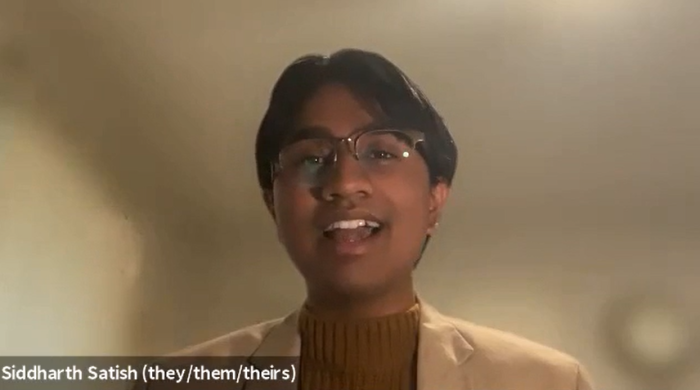
Members of the National Youth Council are already taking action to raise awareness and end stigma surrounding mental health in their own schools and communities. Ayaan inspired his UNICEF Club to get in touch with school administrators to underline the need for increased focus on mental health resources.
“The UNICEF Club at my school is trying to become a greater part of mental health resource distribution and creation at our school," said Ayaan. "The school administration has been very kind and receptive about the push in mental health resources. Making my school a more aware and understanding place in terms of mental health is critical for resolving the unspoken and sidelined worries of students.”
UNICEF USA Club members have also been addressing mental health among youth on their social channels with the hashtag #OnMyMind. Whether it's navigating school during the pandemic, climate change or access to mental health care, by sharing what's on their mind, club members are hoping to de-stigmatize mental health and encouraging their friends and family to join in on the conversation.
Watch the full recording of this program here. To advocate for mental health support and services, visit the UNICEF USA Action Center.
Top photo: A young girl in Gujarat, India who lost both parents receives alternative care and mental health and psychosocial support through UNICEF coordinators. © UNICEF/UN0378214/Panjwani

